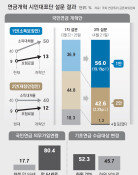Obama sought ideas for N. Korea strategy from civilian experts
Obama sought ideas for N. Korea strategy from civilian experts
Posted August. 23, 2013 05:58,
U.S. President Barack Obama presided over a secret meeting on the U.S. strategy toward North Korea at the White House in April this year with five civilian experts from the U.S., Russia and South Korea, sources said Thursday.
According to multiple sources and some of the participants in the meeting, the meeting took place on April 29, a week before the Seoul-Washington summit, for 80 minutes.
The participants in the meeting were David Straub, associate director of the Korean Studies Program at Stanford Universitys Walter H. Shorenstein Asia-Pacific Research Center and a former U.S. State Department official in charge of Korean affairs, Jonathan Pollack, director of the John L. Thornton China Center at the Brookings Institution, Marcus Noland, deputy director of the Peterson Institute for International Economics, Andrei Lankov, a Russian professor of history at Kookmin University in Seoul, and Lee Sung-yoon, a South Korean-born assistant professor of international politics at Tufts University.
It is unusual for a U.S. president to have a meeting with civilian experts on the U.S. policy toward North Korea. The meeting suggests that despite fatigue over North Korea, the Obama administration actively sought for various alternatives that would induce Pyongyangs fundamental changes.
According to the sources, Obama positively reviewed his North Korea policy during his first term, saying that it was a good thing to not have talks with Pyongyang for the sake of talks. He sought for advice from the experts, asking for the suggestions of ways to produce more results during his second term in office.
One participant suggested that Washington invite North Koreans overseas for exchanges and teach them everything but how to make nuclear weapons. He was quoted as saying, It does not have to be via South Korea nor the U.S. but via a third country. The U.S. should make a variety of overseas exchange programs for North Korean scholars, members of the elite, government officials and students to help them face the reality of North Korea.
Another participant noted, I had the impression that President Obama was very interested in the suggestion and accepted it positively.
Obama was also briefed on the phenomenon, in which the mechanism of market economy has been spreading in North Korea since the early 1990s. One participant said that the Kaesong Industrial Complexs continued operation will help North Korean workers receive outside news and induce the Norths change. Obama was said to have listened with a positive look.
Obama also said that China was changing, expressing high expectation over the possibility that China would lead the Norths change. However, most of the participants warned against excessive expectations, noting that Washington showed the China chimera (unrealistic idea) phenomenon and that it was unlike for China to fundamentally revise its policy toward North Korea.
Sidney Seiler, the Korea policy chief at the White House National Security Council who arranged the meeting and selected the participants, told them that the meeting did not for a policy review, according to the participants.
The remark suggests that the purpose of the meeting was not to abandon or revise the Obama administrations strategic patience toward the North but to seek ideas that would help it overcome the skepticism that patience would not solve anything.
It is interesting that the U.S. administration sought new ways to fundamentally resolve the North Korean nuclear issue at a time when Pyongyang just began its dual tactics of provocation and dialogue by attempting to hold dialogue with Seoul, Tokyo, Beijing and Washington.
The profiles of the participants suggest that Obama tried to seek alternatives in the conservatives perception of North Korea. Despite slight differences in the participants political leanings, they all perceive the North as a failed or degenerative system and have suggested fundamental alternatives.
One participant said that he remember there was no mention of the six-party talks on the Norths denuclearization during the meeting. The old way of seeking talks with the North for the sake of talks and appeasing it with economic assistance was not an alternative Obama was seeking.







